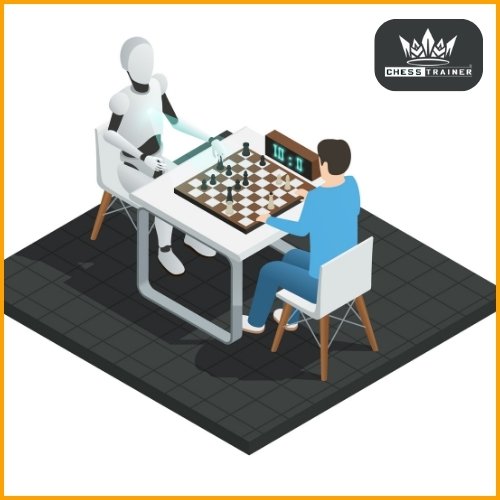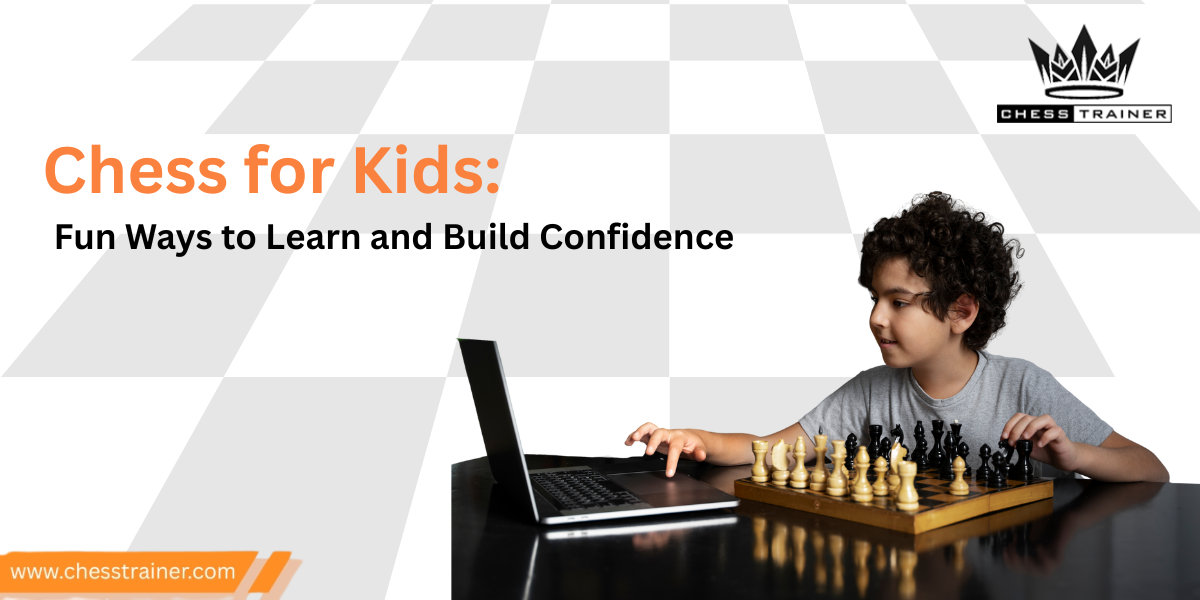Chess for Kids: Fun Ways to Learn and Build Confidence
In today’s digital world filled with gadgets and quick entertainment, finding meaningful ways to enhance a child’s mental growth and confidence is more important than ever. One timeless activity that offers both fun and lifelong learning is Chess for Kids.
Chess is not just a game – it’s a journey that develops patience, problem-solving skills, and emotional resilience. Whether your child is a complete beginner or already curious about strategy games, introducing chess for kids can be one of the smartest parenting choices you’ll ever make.
In this blog, we’ll explore the benefits of chess for kids, how to make learning fun, and why online chess and structured programs like after-school chess programs are becoming so popular among parents and educators.
The Magic of Chess for Kids
When we talk about chess for kids, we’re talking about more than a board game – it’s a tool for building focus, creativity, and confidence. Teaching chess early helps children think ahead, analyze situations, and make better decisions.
Through chess training for beginners, children learn the power of patience and foresight. Unlike fast-paced games that provide instant gratification, chess teaches kids to pause, plan, and think critically. That’s why learn chess for kids programs are growing rapidly across schools and communities worldwide.
The best part? Kids don’t just learn how to win; they learn how to think strategically in all areas of life.
Why Parents Should Teach Chess to Kids
There are countless reasons why parents should teach chess to kids, and one of the most significant is the mental development it fosters. Chess stimulates both sides of the brain – the creative right hemisphere and the analytical left – resulting in a balanced mental workout.
Here are a few reasons why more parents are turning to chess lessons for kids:
- It enhances concentration and patience.
- It encourages problem-solving and logical thinking.
- It builds confidence through structured learning and achievement.
- It promotes emotional resilience — learning to win with humility and lose with grace.
By encouraging chess for child development, parents empower their kids to become disciplined thinkers who can navigate both academic and real-life challenges with confidence.
Cognitive Benefits of Playing Chess
One of the strongest reasons to introduce chess for kids is the profound impact it has on cognitive development. The cognitive benefits of playing chess include improved focus, stronger memory, and better analytical skills.
Studies show that students who participate in chess lessons for kids often perform better in math, reading comprehension, and critical reasoning. The reason is simple: chess trains the brain to see patterns, think ahead, and evaluate consequences.
When children learn chess for kids in structured programs, they develop a growth mindset. They learn that every mistake is a chance to improve — a valuable lesson that extends far beyond the chessboard.
How Chess Builds Confidence in Children
It’s fascinating how chess builds confidence in children. Every time a child solves a puzzle, wins a game, or even learns a new opening strategy, their self-esteem grows. Chess gives kids a sense of control – a skill that helps them in academics, sports, and social interactions.
Even in defeat, children learn resilience. Losing teaches them humility, patience, and the importance of learning from mistakes. These life lessons are embedded in every chess training for beginners session.
Confidence in children doesn’t come from winning alone; it comes from understanding the process — thinking critically, making choices, and standing by them. That’s the power of chess for kids.
Fun Chess Activities for Children
Some creative ideas include
- Story-based chess lessons: Turn pieces into characters with personalities.
- Puzzle challenges: Short tactical puzzles that reward correct moves.
- Mini-games: Simplified versions like “pawn battles” or “checkmate in one.”
- Chess learning games for kids: Online platforms where kids solve fun challenges while learning key tactics.
Using creative ways to teach chess, instructors make sure children enjoy every session — turning complex strategies into playful, memorable experiences.
Chess Learning Games for Kids: Making Chess Fun
Modern parents and teachers now have access to countless chess learning games for kids that combine technology with education. Platforms and apps make it easier for children to learn openings, tactics, and endgames through interactive lessons and puzzles.
These online chess platforms create a safe, playful learning space that balances entertainment and skill-building. Programs designed for chess for kids online classes often include fun quizzes, progress badges, and real-time matches with other students.
This gamified approach to learn chess for kids keeps children motivated while reinforcing essential skills such as pattern recognition and problem-solving.
The Role of Chess Lessons for Kids
Structured chess lessons for kids are the foundation of consistent learning. While casual play is great, professional instruction ensures children grasp fundamental concepts properly — from piece movement to strategic planning.
Certified trainers and coaches use age-appropriate teaching methods that cater to each child’s learning style. With regular practice and guidance, children quickly move from basic concepts to advanced strategies.
If you’re searching for the right start, joining an online chess trainer program or after-school chess program can give your child the perfect balance between discipline and enjoyment.
After-School Chess Programs: Building Lifelong Skills
Many schools now offer after-school chess programs because educators recognize the long-term impact of chess on student performance. These programs promote teamwork, concentration, and sportsmanship.
Through friendly competitions and group activities, students not only learn game strategies but also enhance their communication and social skills. These after-school chess programs often integrate fun chess activities for children, making the learning process interactive and confidence-boosting.
Whether through physical clubs or online chess classes, these programs teach valuable lessons that go beyond the game itself.
Best Age to Start Learning Chess
Parents often ask: What’s the best age to start learning chess?
While there’s no strict rule, experts suggest introducing chess for kids as early as age 5. At this age, children can understand basic concepts like turns, moves, and objectives. However, chess training for beginners can start even earlier through chess learning games for kids designed to simplify learning.
The earlier children are introduced to chess, the more naturally they develop problem-solving skills, focus, and creativity. And thanks to online chess platforms, kids can start learning from home at their own pace, guided by professional instructors.
Creative Ways to Teach Chess to Kids

Traditional teaching isn’t the only way to engage young learners. There are countless creative ways to teach chess that make lessons exciting and relatable.
- Storytelling: Turn the chessboard into a fantasy world where pieces are heroes and villains.
- Drawing exercises: Encourage children to sketch the board and label pieces.
- Team-based activities: Create friendly competitions to build teamwork.
- Music and rhythm: Some coaches use rhythmic chants to help remember moves.
These fun chess activities for children stimulate imagination while developing critical thinking and patience.
Why Online Chess is Perfect for Today’s Kids
In the digital age, online chess platforms have revolutionized the way children learn. Through interactive tutorials, video lessons, and virtual tournaments, chess for kids online classes allow children to learn anytime, anywhere.
Parents love the flexibility, while kids enjoy the gamified learning experience. Plus, platforms with live online chess trainers provide real-time guidance, helping kids correct mistakes and understand strategies deeply.
Whether it’s weekday evenings or weekends, online chess has made the game more accessible and enjoyable than ever before.
Improve Focus and Memory with Chess
It’s scientifically proven that children who play chess regularly show improvement in concentration and memory. When they calculate multiple moves ahead, they exercise both short-term and long-term recall.
This is why teachers often recommend chess for child development — it’s a simple yet powerful tool to improve focus and memory with chess. The habit of analyzing, predicting, and recalling moves strengthens mental agility and academic performance alike.
By enrolling in chess lessons for kids, parents ensure that their children develop sharper minds while enjoying every move.
Chess Training for Beginners: The Perfect Start
Starting with chess training for beginners helps children understand basic strategies before diving into complex tactics. Professional trainers simplify lessons through puzzles, visual aids, and chess learning games for kids, ensuring kids grasp every move’s purpose.
Through structured chess for kids sessions, children develop step-by-step learning habits that encourage consistency, patience, and discipline – key qualities that help in both school and life.
Whether offline or through chess for kids online classes, this foundational training lays the groundwork for future champions.
Conclusion
Chess isn’t just a board game — it’s a life skill. Chess for kids helps shape young minds, nurture creativity, and build confidence from an early age. With the growing popularity of online chess, interactive chess learning games for kids, and expert-led chess lessons for kids, the opportunity to learn has never been more exciting or accessible.
From understanding strategy to developing emotional resilience, the benefits of chess for kids go far beyond the game. So whether your child joins an after-school chess program or trains with an online chess trainer, you’re giving them more than a hobby — you’re giving them a foundation for lifelong success.
Start early, make it fun, and watch your child’s confidence grow with every move.
Also Read: How to Prepare for Your First Chess Tournament: Strategy, Focus, and Success
👉 Follow Us on Social Media! Stay Connected & Stay Ahead! 👇
📘 Facebook || 📸 Instagram || 💼 LinkedIn || 🎯 Twitter || 📌 Pinterest

